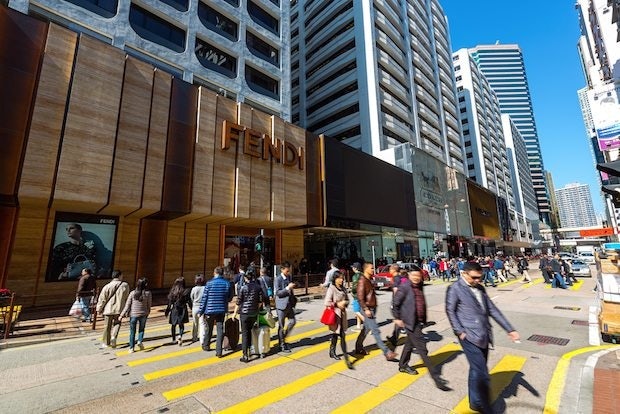
Shoppers on Hong Kong's Canton Road in December 2014. (Shutterstock)
When leading global luxury conglomerate Richemont reported its dismal third-quarter 0 percent global sales growth this week, it blamed two main Asian locations for the slump: Hong Kong and Macau. While China’s Special Administrative Regions have long been been luxury shopping hotspots for mainland tourists avoiding high tariffs, several key developments over the past year have shaken the industry and left brands to ask whether they should start directing more focus toward other big destinations for Chinese shoppers.
Although Hong Kong and Macau were respectively the top two non-mainland destinations for Chinese travelers in 2015, both have have had a rocky year for luxury retail and leisure revenue. In Hong Kong, retail rent growth was the lowest it has been since 2009 in 2014, while sales of jewelry, watches, and other luxury items dropped 12 percent in October. Meanwhile, Macau saw a 2.6 percent drop in total annual gaming revenue for 2014, with a 30 percent decline in December. Experts aren’t expecting things to get much better in 2015 with predictions of a 10 percent decline for the year.
Luxury labels are are citing the Hong Kong and Macau slumps as top reasons for lackluster performance in Asia. Naming difficulties specifically in these two regions, Richemont saw a precipitous 12 percent drop in Asia-Pacific sales for its third quarter, a rate that declined from its already low 0 percent growth rate in the region for the first half of its fiscal year. On Wednesday, Burberry’s CFO reported that its Asia growth rate is in the low single digits specifically because of a Hong Kong slump, despite “robust” growth in mainland China and South Korea.
This trend is especially worrisome for luxury brands, which have long viewed these locations as crucial to both their China and global sales growth. Hong Kong is estimated to take up around a third of mainland luxury purchases as Chinese shoppers head across the border to avoid high tariffs. Mega-brands such as Gucci have around 10 percent of their global sales in Hong Kong, while watch and jewelry companies can see much higher percentages—Hong Kong accounts for around 17 percent of Richemont’s total global sales. In Macau, shopping makes up almost half of per-capita spending, with jewelry and watches taking up 26 percent and handbags and shoes taking up 18 percent of all shopping revenue.
The declines in Hong Kong and Macau are being caused by several different factors. Many of Hong Kong retailers have blamed the city’s massive, months-long Occupy Central protests in the city’s main shopping districts as a major reason for dropping sales, but the city had been seeing a downward trend in sales that began in February after local displays of anti-mainland sentiment surged.
Macau is suffering in part thanks to stricter visa rules that began on July 1 last year that are keeping out frequent visits from high rollers. The new regulations shortened the time that a Chinese visitor is allowed to stay and lengthened the time they must wait between trips—a change that has cut out monthly trips that were often favored by VIP spenders. The rules state that travelers with mainland Chinese passports on a transit visa must prove that they’ve visited a third-party destination. Chinese travelers who enter Macau on a five-day transit visa without going to a third destination are now placed on a watch list that prevents them from staying in Macau for more than one day within 60 days.
For both Hong Kong and Macau, China’s ongoing anti-corruption drive has also been a major factor for luxury sales—especially in industries that have been the hardest-hit by the campaign, such as watches. Research from the Polytechnic Institute of Macau estimated that half of Macau’s VIP gamers were government officials or executives at state-owned enterprises in 2010, before the anti-corruption campaign began.
Luxury brands looking at future retail prospects for these areas should expect growth to expand across Asia in coming years as mainland Chinese travelers head to other countries vying for Chinese tourist revenue with easier visa access, more duty-free sales options, and new gambling and entertainment venues. As the number of outbound Chinese travelers grows, they’re increasingly heading to South Korea, Japan, and Taiwan to shop for luxury, while countries across the region including Australia, the Philippines, and South Korea are developing massive gambling complexes aimed at competing for Chinese tourist revenue. Even the mainland is developing more duty-free shopping options in hopes of gaining sales lost to its neighbors.
China’s ongoing anti-corruption campaign means that as China’s outbound traveler numbers grow, these locations are likely to see more middle-class visitors than VIPs, which is why Macau’s casinos have increasingly embraced the mass market to cope with the slowdown. While these consumers aren't necessarily high rollers, their numbers are expected to grow and their price-savvy attitude means they'll be willing to spend on duty-free luxury when they head outside the mainland to shop.